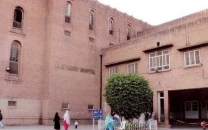EPA greenlights digital monitoring of emissions
Officials say experts will keep an eye on factories, brick kilns from central control room

In a bid to monitor emissions from factories and brick kilns digitally, the Rawalpindi district has received approval for the installation of Environmental Pollution Control System (ECS) and CCTV cameras.
The ECS is designed to curb the release of toxic gases, smog, and harmful black fumes into the atmosphere.
The launch of this programme was marked by a meeting between Department of Environmental Protection and Climate Change Director General Imran Hameed Sheikh and Saqib Rafiq, President of the Rawalpindi Chamber of Commerce. Discussions during this meeting focused on the seamless introduction of the programme within industrial sectors operating in the district.
In a proactive move, the Rawalpindi Chamber of Commerce has issued directives urging full cooperation with the environment department to foster an environment-friendly approach across the district. Industrialists within the designated industrial zones have also been instructed to extend their complete support towards this endeavour.
Under the ambit of this programme, officials from the Environment Protection Department will be stationed at a centralised control room to monitor emissions from brick kilns and industries. This monitoring will be conducted round the clock, with closed-circuit cameras strategically installed at all relevant sites. These cameras will relay live feeds to the control room, enabling real-time surveillance during morning, afternoon, evening, and night shifts.
Any instance of emission exceeding permissible limits will be promptly addressed, with the nearest police station's personnel and administrative officers dispatched to the location. Immediate legal action, including filing formal cases or imposing fines ranging from Rs0.5 to Rs1 million, will be taken against violators.
To ensure sustainable practices, an environment-friendly system will be integrated into all industries, complemented by the adoption of modern zigzag technology in brick kilns. This technology, known for its efficiency in reducing emissions, has been mandated for all kilns, resulting in a notable decrease in their numbers from 270 to 120 across the Rawalpindi district.
However, challenges remain, as highlighted by the Bhatta Khisht Association (Brick Kiln Association), citing the high cost associated with zigzag technology. This expense has led to the closure of smaller kilns, compounded by the sale of vast tracts of land to housing societies, further impacting the brick kiln industry in the region.
Officials said the implementation of the measures will foster environmental stewardship and sustainable industrial practices in Rawalpindi, setting a positive precedent for other regions to follow suit.
Published in The Express Tribune, May 18th, 2024.



















COMMENTS
Comments are moderated and generally will be posted if they are on-topic and not abusive.
For more information, please see our Comments FAQ